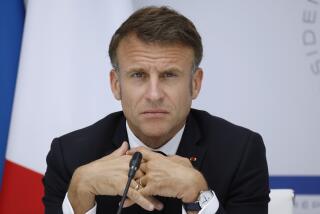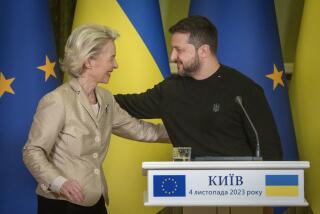11 Countries Pass Monetary Union Muster
Europe’s most ambitious project to date, its planned single currency, passed its day of reckoning Friday with virtual confirmation that the European Monetary Union will start with 11 member states.
Germany, Italy and France, EMU’s three big guns, met a Friday deadline by announcing 1997 budget deficits that were not only low enough to qualify them for the union but that also beat even the most optimistic forecasts.
The data, pouring into the European Commission’s Eurostat agency, means national treasury officials have done their job. Now, politicians will take the lead in shaping EMU for its scheduled January 1999 kickoff of the currency, the euro.
The commission and European Monetary Institute will put forward their recommended starting lineup March 25, with European Union leaders expected to endorse their choices at a special EU summit May 2-3.
Three EU members, Britain, Denmark and Sweden, have opted out of EMU’s first wave, while Greece has conceded it cannot yet make the grade.
The remaining 11 members have unveiled 1997 budget deficit figures that meet the key monetary union qualification of 3% or less of gross domestic product.
The Netherlands, the last to report, said its public-sector deficit was 1.4% of GDP in 1997, although it was expected to rise to 1.7% in 1998.
Germany, the bloc’s traditional economic powerhouse, has stumbled toward the euro finish line, burdened by reunification and record postwar joblessness.
But Friday, Chancellor Helmut Kohl, who has staked his long political career on winning over a skeptical public that cherishes the strength of its mark currency, claimed victory.
Speaking after a report that Germany’s 1997 budget deficit dropped to 2.7% of GDP, Kohl said the data undermined “all doubters who, without any specific knowledge of the data, repeatedly started new discussions about [an EMU] delay.”
Italy, whose economic readiness for EMU has been under closest scrutiny after decades of towering debt and political and financial instability, announced a deficit of 2.7% of GDP, well below recent forecasts.
France said its deficit was exactly 3% of GDP last year and added that its economy, stuck in the doldrums for the last two years, grew last year at its fastest pace since 1994.
Amid the political backslapping, European Monetary Affairs Commissioner Yves-Thibault de Silguy, visiting Italy, warned EMU hopefuls that controlling their debt levels would be key to avoiding future monetary instability.
“What counts is not only the level of debt but its evolution, how fast it is coming down,” he said. “That’s where it’s important to show a lasting convergence.”
Maintaining the EU partners’ rapid progress in fiscal rectitude and belt-tightening will be crucial to the euro’s stability.
Some states have astounded the financial markets in getting into shape for Friday’s deadline, and many skeptics still question whether such discipline will last.
Critics maintain that some of this week’s figures were achieved by higher taxes, one-time levies or accounting devices.
But German Foreign Minister Klaus Kinkel took a swipe at the EMU skeptics who have warned of currency chaos and rising joblessness in a post-EMU Europe.
“This success refutes the euro pessimists,” he said.
More to Read
Sign up for Essential California
The most important California stories and recommendations in your inbox every morning.
You may occasionally receive promotional content from the Los Angeles Times.










